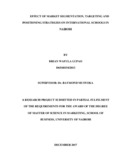| dc.description.abstract | Segmentation, targeting and positioning are tools of marketing used in gaining competitive advantage by a firm in the market. STP can be viewed as main disciplines in strategy of marketing; faults in these areas result in failure and tend to be costly; doing it right leads to success. This study therefore sought to determine the effect of segmentation, targeting and positioning strategies on international schools in Nairobi. The study used a cross sectional descriptive survey design and carried out a census of the 34 international schools. The primary data was collected by use of questionnaires that are semi structured in nature. The semi-structured questionnaires were self-administered to the marketing manager at each international school. The data collected was edited for accuracy, consistency and completeness and then analyzed using descriptive statistics with the help of Statistical Package of Social Sciences. The study found that segmentation based on gender, fees paid and the education system were the most used market segmentation strategies by international schools in Nairobi but the application of undifferentiated targeting, niche market and differentiated marketing strategies by international schools was minimal. The study found that benefit positioning and product positioning by providing exceptional quality of services were the most used positioning strategies by international schools in Nairobi. Additionally, the study found that market segmentation helps international schools to adjust to specific needs in the market, allows international schools to serve their clients according to their needs and targeting can allow international schools to understand the market structure and how to serve it. The study further established that market positioning strategies can help international schools to build their image and can help them to create proper appeals in the minds of the target market. The study concluded that market segmentation strategies, targeting strategies and positioning strategies are vital to international schools and they help international schools to brand and position themselves in a better position. The study recommends that the management of international schools in Nairobi should ensure they incorporate market segmentation strategies, targeting and positioning strategies since they are vital for international schools in Nairobi. | en_US |



